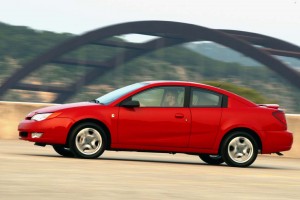
GM and NHTSA are being criticized for ignoring as many as 300 deaths in due to airbag failures that could be attributed to the faulty ignition switches in Saturn Ions and Chevy Cobalts.
The number of people killed due to airbags that failed to deploy due to the faulty ignition switch in the Chevy Cobalt and Saturn Ions recalled by General Motors may be significantly higher than first reported based on new study of the data.
According to a study by the Friedman Research Group, GM reported 303 deaths to the National Highway Traffic Safety Administration (NHTSA) in the vehicles between 2003 and 2012 due to airbag failures. The data was pulled from the agencies Fatal Analysis Reporting System. The study was released in the midst of a flap over GM’s handling of a recent recall for a defective ignition switch the maker admits is linked to a dozen fatalities.
The Washington-based Center for Auto Safety (CAS) commissioned the study and released the results in an open letter to NHTSA late yesterday which criticizes the agency, as well as GM, for not moving more quickly to tackle the ignition switch issue and other problems.
“NHTSA could and should have initiated a defect investigation to determine why airbags were not deploying in Cobalts and Ions in increasing numbers,” wrote Clarence Ditlow, executive director of CAS.
Ditlow pointed out to TheDetroitBureau.com that the data collected by NHTSA doesn’t provide for a faulty ignition switch in the reporting of the deaths. The categories are more general, such as airbag deployment failure, so one cannot assume that all 303 cases where it occurred that the faulty switch is the reason for the failure.
(California questions regulating driverless cars. For more, Click Here.)
“As knowledgeable observers know, FARS tracks raw data. Without rigorous analysis, it is pure speculation to attempt to draw any meaningful conclusions,” the automaker said in a statement. “In contrast, research is underway at GM and the investigation of the ignition switch recall and the impact of the defective switch is ongoing.
(Click Here for more about VW’s goal of selling 10 million vehicles in 2014.)
“While this is happening, we are doing all we can now to ensure our customers’ safety and peace of mind. We want our customers to know that today’s GM is committed to fixing this problem in a manner that earns their trust.”
(To see what GM knew and when it knew it about “Switchgate,” Click Here.)
Ditlow counters that investigations into problems have been started for less and that NHTSA should have recognized the trend and acted sooner.

If the failure to correct the issue was a cost savings issue as some propose, GM is certainly going to pay for that mistake now.